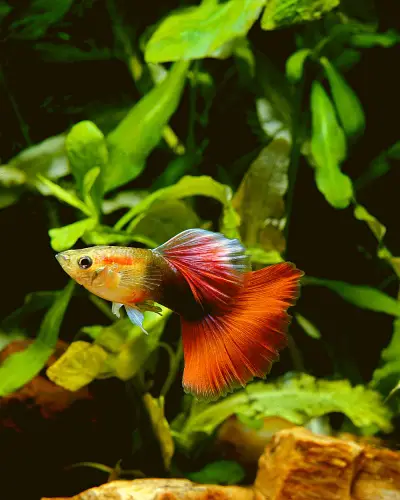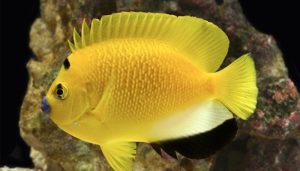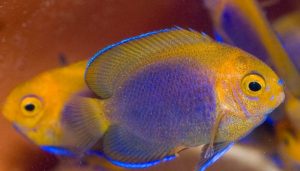Have you ever watched your guppy struggling to swim, floating awkwardly or sinking to the bottom of the tank? These behaviors can be distressing, especially when they signal a problem like Swim Bladder Disease Guppy.
This common condition affects the swim bladder, an organ responsible for buoyancy, making it difficult for your fish to swim normally. While it’s a frequent issue in guppies, many aquarium enthusiasts are unsure of its causes or how to provide the right treatment.
Understanding Swim Bladder Disease is the first step toward helping your guppy regain its health and vitality.
In this guide, we’ll break down what this condition is, explore its causes, and share actionable steps to treat it effectively.

Whether you’re dealing with poor water quality, dietary imbalances, or an infection, you’ll find the solutions you need to ensure your guppy thrives.
Let’s dive in and learn how to bring your beloved fish back to its happy, free-swimming self! Would you like me to continue with more details about causes and treatments?
Table of Contents
ToggleUnderstanding Swim Bladder Disease
Swim bladder disease is a common ailment that affects many guppies, causing them to experience buoyancy issues and swim abnormally.

It is a condition that can be distressing for both the aquarium fish and their owners. Understanding the underlying factors and taking appropriate measures can help your fish recover and maintain their health.
The Swim Bladder and its Function
The swim bladder organ is an internal gas-filled organ that helps fish control their buoyancy. It acts as a floatation device, enabling the fish to ascend, descend, or remain at a specific water level without much effort. The swim bladder functions properly in healthy guppies, allowing them to swim effortlessly.
Swim Bladder Disease: Causes and Symptoms
Swim bladder disease can occur due to various factors. It may be caused by physical abnormalities, such as a compressed swim bladder or an enlarged gastrointestinal tract, or it can result from mechanical or environmental factors.
Some common causes include overfeeding, low water temperature, constipation, bacterial infections, and parasitic infestations. These conditions can disrupt the normal functioning of the swim bladder and lead to swim bladder disease.
Symptoms of swim bladder in guppies include:
- Guppy swimming erratically or floating near the surface
- Inability to maintain balance and stability in the water
- Loss of appetite or difficulty feeding
- Lethargy and reduced activity levels
- Enlarged stomach or intestinal tract
Note: Low water temperature can slow the digestive process, resulting in gastrointestinal tract enlargement that puts pressure on the swim bladder. So it would be best if you increase the temperature.
Symptoms of Swim Bladder Disorder
Careful observation and physical examination are essential to diagnose swim bladder disease in guppy.
– Observing Behavioral Changes
Pay attention to any changes in your guppy’s swimming behavior. It could indicate swim bladder disease if you notice vertical swimming or floating near the surface. Changes in feeding habits and reduced activity levels may also suggest an underlying issue.
– Physical Examination
A physical examination can help confirm the presence of guppy with swim bladder. Gently observe the fish for any physical abnormalities, such as an enlarged stomach or intestinal tract. However, it’s important to note that professional veterinary assistance may be necessary for a more accurate diagnosis.
Prevention of Swim Bladder Disease
Prevention is key when it comes to swim bladder disease. You can minimize the risk of your guppies developing this condition by implementing certain measures.
– Maintaining Proper Water Conditions
Ensure that the water temperature in the aquarium is within the optimal range for guppies, typically between 78-80 degrees Fahrenheit. Sudden fluctuations or extremely low temperatures can stress the fish and contribute to swim bladder issues.
Additionally, maintaining good water quality through regular cleaning and filtration will help prevent bacteria or parasites that can affect the swim bladder.
– Feeding Habits and Diet
Proper feeding habits play a significant role in preventing guppy fish swim bladder disease. Avoid overfeeding your guppies and provide them with a balanced diet. Flake or pellet food specifically formulated for guppies should be the primary source of nutrition. To prevent constipation, occasionally feeding your guppy blanched peas can help regulate their digestive system.
– Avoiding Stress Factors
Stress can weaken a guppy’s immune system, making them more susceptible to swim bladder disease. Keep aggressive fish separated from guppies, as they can cause stress and disrupt their swimming patterns. Additionally, provide plenty of hiding spots and ensure the aquarium environment is calm and free from excessive noise or disturbances.
Treating Swim Bladder Disease Guppy
How to treat guppy swim bladder? If your guppies suffering from swim bladder disease, prompt action is necessary to alleviate their discomfort and promote recovery.
– Isolating the Affected Fish
To prevent the spread of potential infections or parasites, isolate the affected swim bladder guppy in a separate quarantine tank. This will also make it easier to monitor their condition closely.
– Adjusting Water Temperature
Increasing the water temperature by a few degrees can help stimulate the fish’s metabolism and digestion. However, it’s crucial to maintain the water temperature within the safe range for guppies to avoid further stress or complications.
– Dietary Modifications
During the treatment period, consider adjusting the guppy’s diet. Offer easily digestible dried food, such as small portions of high-quality flakes or pellets. Avoid feeding them large quantities of food that tend to float on the water’s surface.
– Medications and Treatments
Medications may be necessary in severe cases to cure swim bladder disease guppies. Consult with a veterinarian or aquatic specialist to determine the appropriate guppy swim bladder treatment options based on your guppy’s condition. Epsom aquarium salt baths or specialized fish medications may be recommended to alleviate symptoms and promote recovery.
Can Swim Bladder Disease in Guppies Be Treated?
Yes, guppy bladder disease can be treated. Depending on the underlying reason, treatment options may include:
- Adjusting the water temperature.
- Fasting the fish for a few days.
- Adding Epsom salt to the water.
- Providing a high-fiber diet.
- Using medications to treat bacterial or parasitic infections.
Commonly Asked Questions about Guppy Swim Bladder Disease (FAQs)
What are the common symptoms of swim bladder disease in guppies?
guppy swim bladder disease can manifest as vertical swimming, floating near the surface, losing appetite, lethargy, and an enlarged stomach or intestinal tract.
How is swim bladder disease caused?
What is the main cause of swim bladder disorder? Various factors, including physical abnormalities, overfeeding, constipation, bacterial infections, and parasitic infestations, can cause guppy swim bladder disease.
What can I do to prevent swim bladder disease in my guppies?
Maintaining proper water conditions, providing a balanced diet, and minimizing stress factors are important. To prevent swim bladder disease in your guppies, keep the water temperature within the optimal range, avoid overfeeding, and ensure a peaceful and clean aquarium environment.
How can swim bladder disease be treated in guppies?
Treatment for swim bladder disease in guppies may involve isolating the affected fish, adjusting the water temperature, modifying their diet, and, in severe cases, administering medications prescribed by a veterinarian or aquatic specialist.
Is swim bladder disease in guppies curable?
With proper care and timely intervention, guppy bladder disease can be managed and often resolved. However, the outcome may vary depending on the issue’s severity and the fish’s overall health.
Can swim bladder disease be contagious to other fish?
is swim bladder contagious? Swim bladder disease itself is not contagious. However, underlying causes, such as bacterial infections or parasitic infestations, can be infectious. It is important to isolate and treat affected fish to prevent the spread of diseases.
How long does it take for a guppy to recover from swim bladder disease?
The recovery time for guppies with swim bladder disease can vary. With proper treatment and care, some fish may show improvement on the fourth day, while others may take longer to recover fully. Monitoring their progress and providing appropriate care is essential.
What is Swim Bladder Disease in Guppies?
Swim Bladder Disease is a common disorder affecting guppies’ swim bladder. The swimming bladder is an organ that helps the fish maintain buoyancy and regulate its swimming depth. When the swim bladder is involved, it can cause the fish to swim vertically or have difficulty maintaining its balance.
What are the clear symptoms of Swim Bladder Disease in Guppies?
The main symptoms of guppy swim bladder disease include, guppy swimming vertically, floating at the surface or sinking to the bottom of the aquarium, difficulty swimming, loss of appetite, and bloated appearance.
What are the main causes of Swim Bladder Disease in Guppies?
Swim Bladder in Guppies can be caused by various factors, including poor water quality, bacterial or parasitic infections, genetic disorders, excessive feeding, constipation, and sudden changes in water temperature.
How can I prevent Swim Bladder Disease in Guppies?
To prevent Swim Bladder Disease in Guppies, it is important to maintain a clean and well-filtered aquarium, avoid overfeeding, provide a balanced diet, monitor water temperature and pH levels, and minimize stress to the fish.
How does Epsom salt help with Swim Bladder Disease in Guppies?
Epsom salt might be a natural remedy for guppy with swim bladder. It helps to reduce inflammation, relieve constipation, and promote the expulsion of waste from the fish’s digestive system, thus relieving the symptoms associated with Swim Bladder Disease.
Can stress coat the swim bladder and cause Swim Bladder Disease in Guppies?
While stress can contribute to various health issues in fish, including Swim Bladder Disease, it does not directly coat the swim bladder. However, stress can weaken the fish’s immune system and make it more susceptible to infections or other factors that may lead to Swim Bladder Disease.
What can I do if my guppy has Swim Bladder Disease?
If your guppy has Swim Bladder Disease, you can try adjusting the water temperature, feeding a high-fiber diet, fasting the fish for a few days, adding Epsom salt to the water, and providing a stress-free environment. If the disease symptoms persist or worsen, consult a veterinarian for further guidance.
Can Swim Bladder Disease harm the swim bladder permanently?
The swim bladder can be permanently damaged depending on the severity and underlying cause of Swim Bladder Disease. However, with proper treatment and management, many fish can recover and regain normal swimming abilities.
How can I help prevent Swim Bladder Disease in my guppies?
To help prevent swim bladder in guppies, you should maintain good water quality, feed a balanced diet, avoid overfeeding, provide regular exercise opportunities, minimize stress, and monitor the fish for any signs of illness or abnormal behavior.
Can guppies get swim bladder disease?
Yes, guppies can get swim bladder disease. This condition affects the swim bladder, causing the affected guppy not swimming properly and maintaining its balance.
Conclusion
Swim bladder disease can pose a significant challenge for guppy owners. By understanding the causes, symptoms, prevention measures, and treatment options, you can provide the best care for your fish. Maintaining proper water conditions, implementing a balanced diet, and addressing any health issues promptly will go a long way in preventing swim bladder disease in your guppy.
Remember, early detection and intervention are crucial in ensuring the well-being of your aquatic companions. I hope you found this article informative and helpful in understanding guppy bladder disease. By implementing the preventive measures and the swim bladder disease guppy treatment options discussed, you can provide the best possible care for your fish. Consult a professional vet for specific advice tailored to your guppies’ needs. Happy fish keeping!
Please note that this article was written for education only and should not replace professional veterinary advice when your guppy suffers.
You might also like
- Constipated Guppy Cure: Symptoms, Causes & Best Treatment!
- 5 Deadly Guppy Diseases and Symptoms You Need to know!
- Dropsy Guppy Symptoms & Best Treatment (Complete Guide)
- Why Do Guppy Fish Stay at the Top of the Tank: 7 Causes & Solutions
- How Frequently Should You Feed Guppies: 9 Tips to Keep Guppy Healthy
- How Many Babies Do Guppies Give Birth To? (Let’s Quell The Myth!)
- Guppy Tail Split: 5 Simple Tricks to Avoid the Heartbreaking
- Bloated Guppy Fish: 3 Surefire Ways to Save Your Fish!
- Guppy Poop Stuck: Reasons, Prevention & Best Solution!




